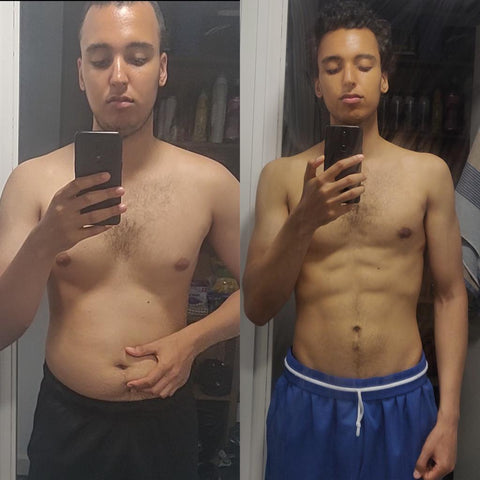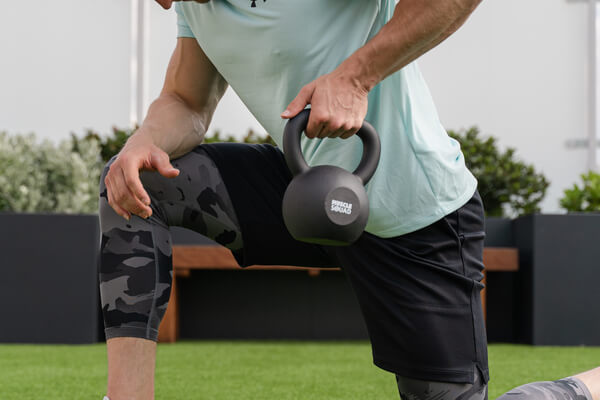If your goal is fat loss, the first step is establishing your start point. This involves taking measurements such as your body weight, your waist circumference and pictures. These will be the metrics you turn to when it comes to measuring progress. Losing body fat is going to involve a change in certain habits which will take time — it's not going to be an overnight process.
If you're not super experienced with fitness training and you have a lot of body fat to lose, you'll be better served making small adjustments to your lifestyle rather than drastic ones. Avoid completely cutting out food groups or trying to go to the gym every single day; starting small gives you a much better chance of success.

Smaller changes such as going on one walk per day, beginning to track your calories or eating out of smaller bowls/plates would be your best bet.
The North Star of fat loss is to create a calorie deficit. This is also known as a negative energy balance. Put simply, body fat is just stored energy. So for us to release this stored energy and shed fat, you first need to burn more calories than you consume.
How can I ensure I'm in a calorie deficit?
Before you start to reduce your calorie intake to lose fat, you need to find out how many calories you 're consuming in the first place. One way to do this is by eating as you normally would for a week and tracking your calorie intake. Every snack, drink, food you pick at — all of it. Weigh yourself at the same time each morning to track how that amount of calories impacts your weight.

If, through the week, your body weight stays relatively the same, this means you are at maintenance calories. From this point on, all you would need to do is set a calorie goal below your maintenance—for example 300 fewer calories each day—and you should notice the kilograms start to slide off the scale.
Things to consider when entering a calorie deficit:
1. Prioritise weight training
Weight training plays an important role in maintaining/building muscle mass. During a fat loss phase, you don't want to lose muscle. This is associated with poorer health outcomes. Although not the primary goal of weight training, it does also provide calorie expenditure which contributes to placing you in a calorie deficit.

2. Tracking your data
Tracking data is going to be crucial in measuring your progress. For example, weighing yourself daily would be wise to calculate an average for each week. Based on those averages, you can start to make changes! Visually, progress photos will also show you the changes that are happening to your physique which is both a useful tool and fantastic for motivation. In most cases, tracking the calories you consume in an app like MyFitnessPal will also help.

3. Increasing your NEAT
NEAT is non-exercise-activity-thermogenesis, which is how much energy your body burns from non-exercise related activities. You can increase your NEAT through small changes to your lifestyle. Let's say you drive to work: how about parking a bit farther from your office, or taking the stairs instead of the lift. NEAT plays a more significant role in energy expenditure than going to the gym does.

4. Eating a balanced diet & avoiding quick fads
You don't need to turn your life upside down to lose fat. However, you will need to make compromises to your diet if you want to make progress. Instead of three courses at dinner, have two. Instead of fast food over the weekend, make your own meals. Include more vegetables in your cooking and try to increase your protein intake.

5. Get enough sleep
Make sure you are sleeping enough every night, as sleep plays an important role in stress management and hormone regulation. The general recommendation is 7-8 hours, but this varies depending on the individual.

6. Stay hydrated
Try this formula: your body weight in kg x 0.033. This will give you a rough estimate of how much water to drink daily, which is crucial for normal body function. Dehydration can be detrimental to your joints, muscles and energy levels.

An optimistic outlook
Losing fat is no easy feat, but it is achievable with consistent effort and commitment. It requires a consideration of your diet, regular exercise and lifestyle changes that promote overall health and well-being. It is important to remember that losing fat is not just about achieving a certain body shape or size, but also about improving your health and reducing the risk of chronic diseases.
To lose fat effectively, you must set realistic goals, track your progress and stay consistent despite fluctuations in motivation. Remember to focus on making sustainable changes to your lifestyle rather than relying on quick fixes or fad diets. With patience, determination and a positive attitude, you can achieve your desired level of fitness and enjoy the benefits of a healthy, active lifestyle.

 Apr 06, 2023 - JY Sharif
Apr 06, 2023 - JY Sharif


Leave a comment: